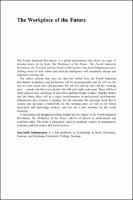The Workplace of the Future
The Fourth Industrial Revolution, the Precariat and the Death of Hierarchies

Download Url(s)
https://library.oapen.org/bitstream/20.500.12657/43897/1/external_content.pdf---
https://library.oapen.org/bitstream/20.500.12657/43897/1/external_content.pdf
---
https://library.oapen.org/bitstream/20.500.12657/43897/1/external_content.pdf
---
https://library.oapen.org/bitstream/20.500.12657/43897/1/external_content.pdf
---
https://library.oapen.org/bitstream/20.500.12657/43897/1/external_content.pdf
---
https://library.oapen.org/bitstream/20.500.12657/43897/1/external_content.pdf
Author(s)
Johannessen, Jon-Arild
Collection
Knowledge Unlatched (KU)Language
EnglishAbstract
The Fourth Industrial Revolution is a global development that shows no signs of slowing down. In his book, The Workplace of the Future: The Fourth Industrial Revolution, the Precariat and the Death of Hierarchies, Jon-Arild Johannessen sets a chilling vision of how robots and artificial intelligence will completely disrupt and transform working life.
The author contests that once the dust has settled from the Fourth Industrial Revolution, workplaces and professions will be unrecognizable and we will see the rise of a new social class: the precariat. We will live side by side with the 'working poor' – people who have several jobs, but still can’t make ends meet. There will be a small salaried elite consisting of innovation and knowledge workers. Slightly further into the future, there will be a major transformation in professional environments. Johannessen also presents a typology for the precariat, the uncertain work that is created and develops a framework for the working poor, as well as for future innovation and knowledge workers, and sets out a new structure for the social hierarchy.
A fascinating and thought-provoking insight into the impact of the Fourth Industrial Revolution, The Workplace of the Future will be of interest to professionals and academics alike. The book is particularly suited to academic courses in management, economy, political science and social sciences.

